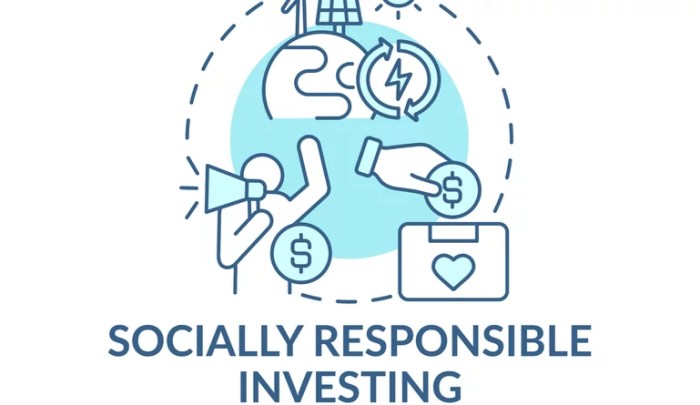Yo, check it out! Socially responsible investing is all the rage right now. It’s like making money while making a difference, you feel me? Let’s dive into this world where financial gains meet social impact in the coolest way possible.
Now, let’s break it down and get the lowdown on what socially responsible investing is all about.
Definition and Importance of Socially Responsible Investing

Socially responsible investing (SRI) involves investing in companies that are committed to social and environmental responsibility, in addition to generating financial returns. This means considering not only the financial performance of a company but also its impact on society and the planet.
Key Reasons Why SRI is Important
- Social Impact: SRI allows investors to support companies that are making a positive difference in the world by promoting social justice, environmental sustainability, and ethical business practices.
- Risk Management: Companies that prioritize social responsibility are often better equipped to manage risks related to environmental disasters, social controversies, and ethical breaches, which can ultimately protect investors’ portfolios.
- Long-Term Sustainability: Investing in socially responsible companies can contribute to long-term sustainability by fostering responsible business practices that benefit not only the current generation but also future generations.
- Consumer Demand: With growing awareness and demand for ethical products and services, companies that demonstrate social responsibility are more likely to attract consumers and gain a competitive edge in the market.
Strategies for Socially Responsible Investing
When it comes to socially responsible investing, there are several strategies that investors can utilize to align their values with their investment choices.
Positive or Best-in-Class Screening
Positive screening involves selecting investments based on specific ESG criteria, such as companies with strong environmental practices, diverse boards, or ethical supply chains. Investors actively seek out companies that align with their values and exclude those that do not meet their standards.
Negative or Exclusionary Screening
Negative screening involves excluding certain industries or companies that do not align with an investor’s values or ethical beliefs. For example, an investor may choose to avoid investing in companies involved in tobacco, weapons manufacturing, or fossil fuels.
Impact Investing
Impact investing focuses on generating positive social and environmental impact alongside financial returns. This strategy involves investing in organizations or projects that aim to address specific social or environmental issues, such as clean energy, affordable housing, or healthcare access.
Shareholder Advocacy
Shareholder advocacy involves actively engaging with companies to promote positive change on ESG issues. Investors use their shareholder voting rights to advocate for greater transparency, diversity, sustainability practices, or other ESG initiatives within companies they are invested in.
Thematic Investing
Thematic investing involves targeting investments in specific themes or sectors that align with an investor’s values or beliefs. For example, an investor may choose to focus on renewable energy, gender equality, or water conservation as part of their investment strategy.
Community Investing
Community investing involves directing capital towards underserved communities or marginalized populations to promote economic development and social impact. This strategy aims to provide financial support to organizations or projects that benefit local communities and address social inequalities.
Impact of Socially Responsible Investing
Socially responsible investing (SRI) can have a significant positive impact on both society and the environment. By incorporating environmental, social, and governance (ESG) factors into investment decisions, SRI aims to promote ethical practices and sustainability. This approach not only benefits the planet and communities but also generates financial returns for investors.
Potential Positive Impact of SRI
- SRI encourages companies to operate in a socially and environmentally responsible manner, leading to reduced carbon emissions, improved labor practices, and positive community engagement.
- Investing in companies with strong ESG performance can drive innovation and long-term growth, creating a more sustainable economy.
- SRI can influence corporate behavior by rewarding companies that prioritize sustainability and ethical practices, ultimately fostering a more responsible business culture.
Comparison of Outcomes: Traditional Investing vs. Socially Responsible Investing
- Traditional investing focuses solely on financial returns, often overlooking the broader impact of companies on society and the environment.
- On the other hand, SRI considers not only financial performance but also the ethical and sustainable practices of companies, leading to investments that align with investors’ values and beliefs.
- While traditional investing may prioritize short-term gains, SRI takes a more holistic approach, promoting long-term value creation and positive societal change.
Challenges and Criticisms of Socially Responsible Investing
When it comes to socially responsible investing (SRI), there are several challenges that investors may face in implementing SRI strategies. Additionally, there are common criticisms of SRI that need to be addressed in order to better understand its impact and effectiveness.
Challenges in Implementing SRI Strategies
- Limited Investment Options: One of the challenges investors face is the limited availability of SRI funds and investment opportunities compared to traditional investment options.
- Performance Concerns: Some investors worry that focusing on social and environmental criteria may negatively impact the financial performance of their investments.
- Lack of Standardization: SRI lacks a standardized set of criteria or guidelines, making it challenging for investors to assess the social and environmental impact of their investments accurately.
Criticisms of Socially Responsible Investing
- Greenwashing: Critics argue that some companies engage in “greenwashing,” where they present a positive image of their environmental practices without making substantial changes.
- Limiting Diversification: Critics claim that SRI strategies can limit diversification opportunities for investors, potentially leading to higher risk levels in their portfolios.
- Subjectivity and Bias: Some critics argue that the subjective nature of social and environmental criteria in SRI strategies can lead to biases in decision-making and evaluation processes.






